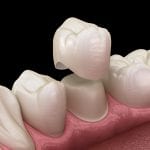Visiting your dentist for routine cleanings and checkups is more than “just a cleaning.” During your visit, we assess your gum tissues for disease, check the hard structures for decay and educate as well as coach patients on how to achieve optimal dental health. In order to diagnose any type of disease in the mouth, a few things are needed. Dental x-rays based on ADA recommendations and patient risk factors, as well as history are updated. X-rays help the dentist and hygienist determine if there are cavities, any areas of bone loss and screen for dental tumors, cysts, etc. After Read More →
Periodontal Disease and Gingivitis – What’s the Difference?

The importance of regular dental care for seniors

Routine dental care is vital to people of all ages, but especially important for seniors. As we age, our body endures an array of changes that can have detrimental consequences to our mouths. As a hygienist, I often hear stories from patients who grew up without routine dental care. Patients weren’t informed of the benefits of preventative dentistry. In turn, this philosophy may have shaped the future of dental needs and most of these patients are seniors. One of the most common changes that affect senior’s oral health is the addition of medications to maintain blood pressure, cholesterol, anxiety or Read More →
Working Through COVID-19 in a Dental Setting

Family Dentist Tree has been successfully back up and running since mid-May. We continue to follow all current guidelines from the CDC, the Minnesota Department of Health, the American Dental Association and the Minnesota Board of Dentistry. Safety is our number one priority when caring for our patients and staff through the ever changing world around us. Our hygienist, Christina, is here to walk you through a typical appointment at our office with our new COVID-19 protocols in place. Prior to your appointment, you will be asked screening questions by phone, text or e-mail to ensure that you Read More →
Options for Teeth Whitening

Most people desire a dazzling white smile. But with so many available teeth whitening tools and products, where should you start? There are several whitening products on the market and available over the counter, but not all of these options work. Whitening rinses and toothpastes do not sit on your teeth long enough to make much of a difference. Teeth whitening toothpastes often have very abrasive particles that act as a surface stain remover, but can’t actually penetrate the tooth to attain a whiter smile. In turn, these pastes can create or worsen tooth sensitivity. Crest Whitestrips are an over Read More →
What to Know Before Your Child Gets Braces

We hope our teeth last us a lifetime. Sometimes, we experience crowding, excessive wear or even jaw issues because of teeth alignment. Finger sucking, tongue thrusting and other habits can also cause teeth to malfunction. Therefore, it is not uncommon to see children and teens wearing braces. Over the years, orthodontics has advanced with a wide range of techniques and knowledge about how our teeth function, leading to better treatment options. Routinely bringing children to the dentist gives both the dentist and parents an idea of how a child’s smile is developing. Your dentist will assess not only for cavities, Read More →
Root Canals vs. Extractions: Pros and Cons

When tooth pain strikes, our instinct is to get relief quickly. Toothaches seem to happen at the most inconvenient times and can put a damper on our plans. But often, there are options, such as root canals and extractions, to treat a tooth that is causing severe pain. If a tooth has been injured from previous trauma, dental work or decay, your dentist will assess the extent of the injury and determine whether the tooth is savable. If there is enough tooth structure left and the tooth hasn’t already been previously treated with a root canal, your dentist may recommend Read More →
All About Veneers

Veneers have gained a lot of popularity over the years, due to the pleasant aesthetics they bring to a smile. Veneers are thin coverings that are bonded to the front surface of a tooth. They are used to replace the shape of teeth, fill spaces and blend colors of teeth that may have demineralization or discolored pits. There are two types of materials generally used for veneers: porcelain and resin/composite. Porcelain doesn’t stain as easy as composite/resin. For this type of veneers, the tooth is prepped and an impression is sent to a lab to makes the veneers. It can Read More →
The Truth About Root Canals
A root canal may not be a dream day at the dentist, but sometimes it is necessary. In some cases, it is needed when a cavity is too deep and extends into the nerve of the tooth. A root canal may also be needed if a tooth has a crack that extends into the nerve. Both of these issues can cause a nasty toothache, which you’ll want taken care of quickly. What is a Root Canal? A root canal is a process in which the top of the tooth is opened and the nerve is accessed. The dentist or endodontist Read More →
Preparing Your Child for their First Dental Visit

A child’s first visit to the dentist is a special one, and we love to make it just that! We are often asked about the appropriate age for a child’s first dental visit. We usually say anytime is fine, if you have a dental concern. For a routine checkup, between the ages of 2.5 and 3 work well! The first dental visit consists of getting the child’s medical history, bringing them back to the exam room and familiarizing them with the dentist! A ride in the chair (even if on mom or dad’s lap) and showing our fun tools (the Read More →
How Long Will Crowns Last?

Crowns are a common practice in dentistry. They are used to help prevent further cracking, to protect already heavily filled teeth, and for aesthetics. Many of our patients ask how long their crowns will last. The answer is: it depends! Crown Longevity Depends on Good Home Care There are many factors that go into the longevity of a crown. A big misconception is that crowns can’t get cavities. A crown is simply a real tooth, covered. The tooth still has a root and nerve. There are still surfaces of the tooth that are exposed and capable of getting cavities. Meticulous Read More →